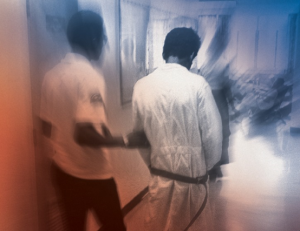Human rights violations in Taiwan mental hospital
At the end of September this year that the Yuli Hospital of the Ministry of Health and Welfare in Hualien city treated patients as animals during the epidemic.
The workload of patients with mild mental disorders is more than the staff employed by the hospital. They have to work 11 hours a day and have no time to participate in functional therapy activities.”
KAOHSIUNG, TAIWAN, October 31, 2022 /EINPresswire.com/ -- Taiwanese media reported at the end of September this year that the Yuli Hospital of the Ministry of Health and Welfare in Hualien treated patients as animals during the epidemic. The environment in the hospital was harsh, and finally the patients and staff complained to the relevant units, exposing the inhumane treatment of the patients for half a year. Human rights groups that care about people with mental disabilities also issued a statement opposing the unrestricted "restriction of personal freedom" because of epidemic prevention and demanding that the hospital return patients to the life they deserve.— Mr. Lo
According to an exclusive report by the United Daily News, the Ministry of Health and Welfare's Yuli Hospital restricts the movement of patients, and the hospital's management has been imposing stricter isolation rules than the central government for a long time.
When hospital employees were quarantined because their family members were diagnosed, all the patients the employees had cared for were also quarantined in their dormitories. Many dormitories do not have toilets, only one potty chair can be shared during the quarantine period, and all roommates can see when someone defecate.
In Taiwan, the Yuli Hospital of the Ministry of Health and Welfare in Hualien is very special. There are more than 2,000 patients in the hospital. The length of hospitalization here seems to be indefinite. People who are discharged after two years of residency are probably miracles and are envied by other patients, and it is not uncommon for people to be hospitalized for more than ten years, and there are many who are hospitalized for decades. Some of the more stable patients in it, and some of them will be assigned to internal labor work in the hospital, such as cleaning, painting, baking, and earn meager wages.
This time, patients and staff at Yuli Hospital of the Ministry of Health and Welfare took sides and clashed with the hospital's management. It is because of the inhumane "isolation of the epidemic" by the hospital management, which essentially puts patients under house arrest in a harsh environment. The way to isolate the sick is to lock them in the bedroom, not to do labor, not to see family members, and not to use the toilet facilities. However, due to severe nosocomial infections and no patients to assist in the work, hospital staff were exhausted due to understaffing.
According to the United Daily News, one patient said that during the epidemic, he was often asked to be locked in a small room with several people and was locked several times. At one point he was locked in a room of five or six people, sharing only a dirty potty chair. At that time, he always asked the staff to open the door and let him use the toilet. But the staff didn't open the door and he could only poop on the potty chair. The three meals and excretion are all in the same space, there is a bad smell in the room when eating, it feels like a caged animal.
In response to the protests by the media and human rights groups, the hospital's management and public relations staff still declared that they "work hard to protect the rights and interests of patients and their families." The two sides held their own opinions and debated fiercely in the media.
News reports surfaced the fact that patients in psychiatric institutions lost their human rights, and human rights violations continued to be staged in psychiatric institutions into the 21st century.
Mr. Lu, who has been a patient in Yuli Hospital of the Ministry of Health and Welfare for 18 years, shared his 18-year experience of "working" for Yuli Hospital with CCHR Taiwan (Citizens Commission on Human Rights Taiwan). Mr. Lo said that the workload of patients with mild mental disorders is more than the staff employed by the hospital. They have to work 11 hours a day and have no time to participate in functional therapy activities because they can't finish their work.
Patient rights have been a neglected topic in the global mental health field. From the recent news from the Yuli Hospital of Taiwan's Ministry of Health and Welfare, the hospital's arrogant and unreasonable restrictions on the movement of residents and patients have caused the management level of Taiwan's mental hospitals to fall back two hundred years. Hospitals confine patients, let patients defecate and eat in the same room, and make the house stink.
In a mental hospital setting, coercive practices may include, for example, involuntary admission, involuntary treatment, the use of isolation, and coercive restraint. This time, the arbitrary practice of the hospital management in Yuli Hospital further highlights the fact that psychiatry uses medical treatment as an excuse, in fact, it "expands power and abuses power" and violates the human rights of patients. Mental illness requires new, more effective and humane medical directions that may truly advance the health and well-being of mentally ill people.
Eric Tung
CCHR Taiwan
8677228011
cchrtwn@cchr.org.tw
Visit us on social media:
Facebook
Twitter
瘋人院十八年,違反人權見聞錄
Legal Disclaimer:
EIN Presswire provides this news content "as is" without warranty of any kind. We do not accept any responsibility or liability for the accuracy, content, images, videos, licenses, completeness, legality, or reliability of the information contained in this article. If you have any complaints or copyright issues related to this article, kindly contact the author above.

